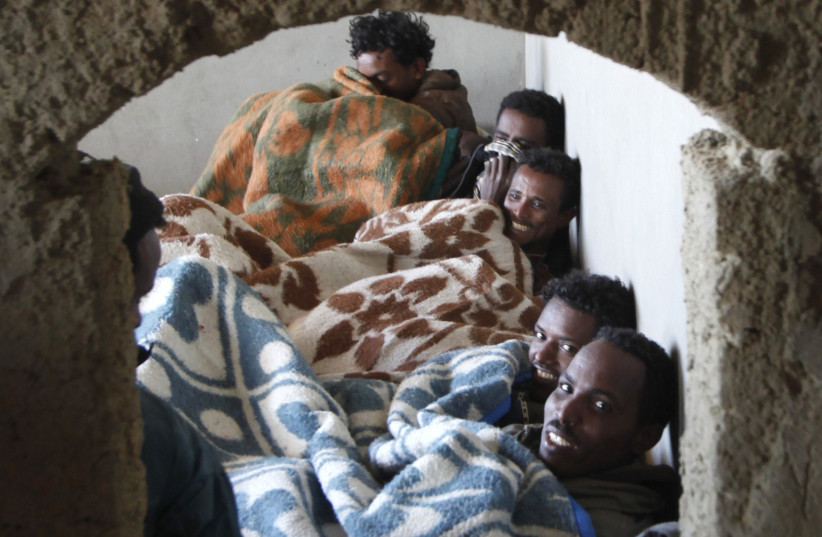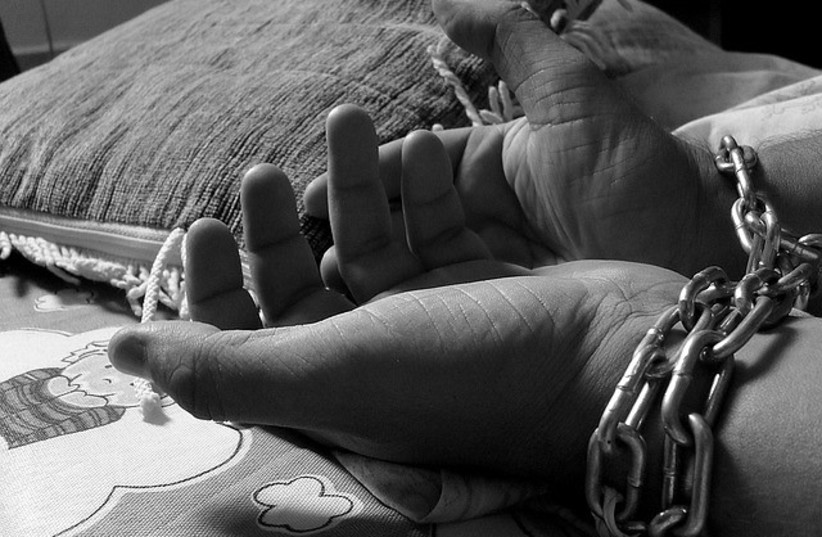Israel failed to meet the minimum United States standards to combat human trafficking within its borders despite steps it took to improve enforcement, the US State Department said in an annual report it released on the issue last week.
Among the key problems was that “the government’s efforts to hold labor traffickers criminally accountable remained inadequate” and it “did not consistently investigate labor trafficking cases referred by NGOs,” the report stated.
The annual document includes country reports from around the globe that divides nations into four standards, of which number one is the gold standard, a rank Israel held until two years ago.
The US downgraded Israel to its Tier Two grouping due to inadequate law enforcement, victim protection and prevention efforts, according to the 2021 report. It’s a ranking that acknowledges Israeli efforts while still criticizing Israel for failing to hit the mark on the matter.
“Israel does not fully meet the minimum standards for the elimination of trafficking but is making significant efforts to do so,” the US State Department said in its report.

The report’s minimum standards of effort required to be a Tier One nation include “implementation of human trafficking laws through vigorous prosecution” and “proactive victim identification measures,” among others, the report stated.
How did Israel deal with human trafficking last year?
Israel recognized 101 victims of trafficking last year, an increase from the 51 victims it acknowledged in 2021, according to the State Department report.
Of these victims, 73 were subject to sex trafficking, and 67 were foreign, having come from Ukraine, Russia and Brazil, among others. The count of foreign victims also included Palestinians from the West Bank and Gaza.
Several Israeli NGOs who provided the US with information on the problem charged that Israel lacked proactive actions to combat trafficking.
“The government has not budgeted for the new government plan to fight human trafficking, and enforcement in the field is woefully inadequate,” said Noa Rodman, the Rehabilitation and Anti-Trafficking Coordinator of the Task Force on Human Trafficking and Prostitution (TFHT), in a statement to The Jerusalem Post.
TFHT claimed that Israeli officials tasked with identifying trafficking victims were not properly trained.
“Though we urge adoption of a pilot program to integrate a social worker during the inspection process at the airport when trafficking is suspected, unfortunately, there is insufficient training for the border control agents who must identify victims of trafficking being brought into Israel,” Rodman added.
According to the State Department report, one trafficking victim met regularly for 11 years with Population and Immigration Authority officers without them recognizing her as such.
NGOs also told the US that “the government’s high evidentiary standard to recognize victims discouraged victims from seeking government assistance.”
Shira Abbo, who heads the public policy department for the Israeli NGO, The Hotline for Refugees and Migrants, said that the report was accurate.

“It shows exactly the flaws that are here,” said Abbo, who explained that her organization had also spoken with the State Department.
“The state has to identify victims itself and not only rely on NGOs identifying victims, which is mostly what happens now,” she said.
Israel’s high burden of proof in trafficking cases has re-traumatized victims and prevented them from turning to authorities, the report stated. It acknowledged that Israel reduced the need for extensive victim interviews last year but noted that the traumatizing requirement of third-party witnesses remains.
Israel also failed to meet the minimum standards for oversight of foreign populations and foreign labor recruitment, the report said. It explained that approximately 14,000 Ukrainian refugees ineligible for Law of Return asylum worked in Israel under tourist visas as of March 2023. These visas have unclear work policies, resulting in increased vulnerability to trafficking, according to the report.
Lawful restrictions toward foreign workers also play a role, according to the State Department report. Those in the caregiving sector, for example, face legislative barriers that prevent them from changing their employer, forcing them into exploitative contracts with high worker-paid fees, as written in the report.
Many Palestinian workers in Israel experience something similar, the report said, explaining that employers often withheld identification papers, thereby restricting their movements within Israel. NGOs also complained to the US about a lack of labor inspectors, interpreters and social workers operating in fields dominated by foreign workers.
“In the case of people who come as work migrants, the regulations themselves… make it very easy for employers to hold them in slavery-like conditions,” Abbo remarked.
Israel Police is unable to handle human trafficking issues
NGOs also noted that police departments dealing with the issue have been severely understaffed for years and that investigations have therefore not taken place in situations where there was ample evidence to warrant one, reads the report.
The issue of human trafficking is “not prioritized,” according to Abbo. “It’s very easy for the state to turn a blind eye. It’s not just in the matter of trafficking. People who are undocumented, people who are migrants. Even migrants who come to work as migrants, legally. The state doesn’t see them… They are on the outskirts of Israeli society.”
"Tens of thousands of men and women are in a struggle for survival that exposes them [to] exploitation by human traffickers,” Rodman said after she acknowledged the Ministry of Justice’s human trafficking unit’s “appreciable” but inadequate efforts to prevent human trafficking within Israeli borders.
The US report also condemned Israel’s failure to proactively screen for trafficking vulnerable populations, like undocumented African migrants and foreign workers employed by foreign construction companies, claiming that this shortcoming resulted in victims receiving penalties for crimes incited by their perpetrators, like immigration violations.
The Justice Ministry said it had increased its efforts to combat trafficking in the last year, including with respect to victim recognition and improved assistance to handle foreign worker complaints. The ministry said it was disappointed that the US chose “not to raise Israel to its rightful place in this year's ranking, even though the report reflects significant and sustainable progress," adding that it will be continuing to expand efforts as a part of a multi-year implementation plan.
The report listed 30 countries as Tier One, including the US, UK, Philippines, Cyprus and Taiwan. On the Tier Two track, alongside Israel, the US listed 105 other countries including Armenia, Brazil, Ethiopia, India and Romania.
Twenty-four countries occupied the lowest rank, including some countries where the state sponsors human trafficking in camps or other state-affiliated locations. Some of these nations included Afghanistan, Eritrea, Iran, China, Russia and Syria.
At the State Department’s press event marking the report’s release last week, US Secretary of State Antony Blinken called for “communities coming together to support survivors” and “all hands on deck” to combat the issue.
